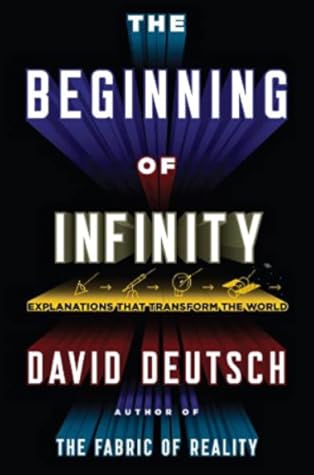More on this book
Community
Kindle Notes & Highlights
Read between
July 8 - September 12, 2022
Scientific theories are explanations: assertions about what is out there and how it behaves.
scientific theories are not ‘derived’ from anything. We do not read them in nature, nor does nature write them into us. They are guesses – bold conjectures. Human minds create them by rearranging, combining, altering and adding to existing ideas with the intention of improving upon them.
Experience is indeed essential to science, but its role is different from that supposed by empiricism. It is not the source from which theories are derived. Its main use is to choose between theories that have already been guessed.
the question that sceptics (friendly and unfriendly) raised from the outset always remained: how can knowledge of what has not been experienced possibly be ‘derived’ from what has? What sort of thinking could possibly constitute a valid derivation of the one from the other?
Scientific explanations are about reality, most of which does not consist of anyone’s experiences.
in reality the future is unlike the past, the unseen very different from the seen. Science often predicts – and brings about – phenomena spectacularly different from anything that has been experienced before.
Even in everyday life we are well aware that the future is unlike the past, and are selective about which aspects of our experience we expect to be repeated.
For if one cannot derive predictions from experience, one certainly cannot derive explanations. Discovering a new explanation is inherently an act of creativity.
To this day, most courses in the philosophy of knowledge teach that knowledge is some form of justified, true belief, where ‘justified’ means designated as true (or at least ‘probable’) by reference to some authoritative source or touchstone of knowledge. Thus ‘how do we know…?’ is transformed into ‘by what authority do we claim…?’
It converts the quest for truth into a quest for certainty (a feeling) or for endorsement (a social status). This misconception is called justificationism.
The opposing position – namely the recognition that there are no authoritative sources of knowledge, nor any reliable means of justifying ideas as being true or probable – is called fallibilism.
we perceive nothing as what it really is. It is all theoretical interpretation: conjecture.
If all our theories originate locally, as guesswork in our own minds, and can be tested only locally, by experience, how is it that they contain such extensive and accurate knowledge about the reality that we have never experienced?
Testability is now generally accepted as the defining characteristic of the scientific method. Popper called it the ‘criterion of demarcation’ between science and non-science.
The reason that testability is not enough is that prediction is not, and cannot be, the purpose of science.
instrumentalism. It denies that what I have been calling ‘explanation’ can exist at all.
relativism, the doctrine that statements in a given field cannot be objectively true or false: at most they can be judged so relative to some cultural or other arbitrary standard.
To the extent that we are on a ‘spaceship’, we have never been merely its passengers, nor (as is often said) its stewards, nor even its maintenance crew: we are its designers and builders.
Blind optimism is also known as ‘overconfidence’ or ‘recklessness’. An often cited example, perhaps unfairly, is the judgement of the builders of the ocean liner Titanic that it was ‘practically unsinkable’. The largest ship of its day, it sank on its maiden voyage in 1912. Designed to survive every foreseeable disaster, it collided with an iceberg in a manner that had not been foreseen. A blind pessimist argues that there is an inherent asymmetry between good and bad consequences: a successful maiden voyage cannot possibly do as much good as a disastrous one can do harm. As Rees points out, a
...more
The question about the sources of our knowledge…has always been asked in the spirit of: ‘What are the best sources of our knowledge – the most reliable ones, those which will not lead us into error, and those to which we can and must turn, in case of doubt, as the last court of appeal?’ I propose to assume, instead, that no such ideal sources exist – no more than ideal rulers – and that all ‘sources’ are liable to lead us into error at times. And I propose to replace, therefore, the question of the sources of our knowledge by the entirely different question: ‘How can we hope to detect and
...more
Just as the institutions of science are structured so as to avoid entrenching theories, but instead to expose them to criticism and testing, so political institutions should not make it hard to oppose rulers and policies, non-violently, and should embody traditions of peaceful, critical discussion of them and of the institutions themselves and everything else.
The ideal towards which this is working is not that nothing unexpected will go wrong, but that when it does it will be an opportunity for further progress.
If something is permitted by the laws of physics, then the only thing that can prevent it from being technologically possible is not knowing how.
Optimism implies all the other necessary conditions for knowledge to grow, and for knowledge-creating civilizations to last, and hence for the beginning of infinity.
We have, as Popper put it, a duty to be optimistic – in general, and about civilization in particular.
One can argue that saving civilization will be difficult. That does not mean that there is a low probability of solving the associated problems. When we say that a mathematical problem is hard to solve, we do not mean that it is unlikely to be solved. All sorts of factors determine whether mathematicians even address a problem, and with what effort. If an easy problem is not deemed to be intere...
This highlight has been truncated due to consecutive passage length restrictions.


